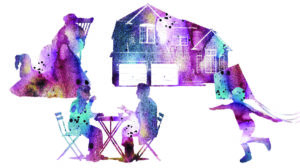Full-Circle Blessing
| August 28, 2019Wow, I remember thinking. That’s so beautiful. She does that, like, every day?

I thought it was very sweet the first time I witnessed it. I still thought so by the fifth time, and I like to think my opinion didn’t change by the tenth. But by then I was already part of the family, and had learned to smile at the predictability of it, like everyone else.
As a kallah, I flew to my husband’s hometown for an extended Shabbos. On Friday morning, as my father-in-law was leaving for work, my mother-in-law called out an urgent, “Wait!” and rushed to the front door.
“Hashem yishmorcha mikol ra, yishmor es nafshecha…” I heard her murmur. “Hashem yishmor tzeis’cha u’vo’echa mei’atah ve’ad olam …”
Wow, I remember thinking. That’s so beautiful. She does that, like, every day?
It was summertime, and the kids were home, but one little brother was in a special program, and my chassan and I were going to bring him there. Right before we left, Ima came to the door, pulled little Dovi close to her, and again, the same parting words: “Hashem yishmorcha mikol ra…”
Over the years I got used to that parting brachah. I won’t say it was a family joke, because no one actually made fun of it, but it certainly was a routine the kids sometimes copied. Okay, maybe even smirked while they did.
When we’d take leave of my siblings-in-law after getting together, someone would inevitably drawl the first few words of their mother’s brachah, perfectly imitating her Midwestern twang. “Hashem yishmorcha…” Even the neighbors’ kids were in on it, and as bochurim, when they’d leave my in-law’s house after a Shabbos seudah, it was a given that one of them — or all — would stop at the door and intone the by-now predictable words as they slapped each other on the back. Ha, ha, how cute.
Thinking about it now, I see the discrepancy between the weight with which my mother-in-law imparted those words and the casualness and almost nonchalance with which her recipients received them. When one of her boys got into trouble in school, he’d come home and say — only half kidding, “Well, Ima didn’t bentsh me this morning, so what do you expect?”
A good decade and a half after my marriage, one of my younger brothers married the daughter of dear friends of my in-laws, and got into the habit of visiting my in-laws whenever they were in town. Imagine my surprise when after a visit to my home, my brother got ready to leave and said, “Take care, good night! Hashem yishmorcha mikol ra…” and gave a perfect rendition of Ima’s famous parting words! Oh, how we all laughed, and I immediately called Ima to inform her that her brachah was making its rounds.
Time has a way of marching on, and my oldest was leaving for a year in Eretz Yisrael. We all milled around at the TSA security checkpoint and stalled for time, not wanting to bid that final goodbye. I willed myself not to lose it, wanting to put up a strong front for my bechor (and to ensure my very socially-self-conscious teenagers wouldn’t do their whole, “Maaaaaa! We’re in puuuuuublic!!!!! It’s soooooo embarrassing!” thing).
We were doing okay. I can’t say I didn’t get teary, a massive boulder forming in my throat, when those very same teenagers suddenly broke down, bawling unabashedly as they said their goodbyes to their brother. (Ha. In public!) But I was still keeping it together, thank you.
Then it was my turn. I stood next to my son, hugged him, and my heart was so full of… of…. something… I couldn’t place this feeling. There was so much to say, so much to daven for—
— too much to daven for —
— and I simply couldn’t formulate my words to my son.
It wasn’t a conscious decision. It just happened. Suddenly my hands were high up, on his head, and the next thing I knew, the words were coming by themselves, from someplace so deep, so hidden, I hadn’t known they were there. It began with the standard brachah we say when we bentsh our children: “Yesimcha Elokim… yevarechecha Hashem viyishmerecha…”
But the next words caught even me by surprise, as they tumbled from my mouth.
“Hashem yishmorcha mikol ra—” And the tears were unleashed.
There it was. Ima was right. The only words a mother ever really needs. Standing there, unable to find my own words, my mother-in-law’s son watching, nodding his head slightly, Ima’s words found me.
“—yishmor es nafshecha—” By now I had lost it, and the tears would not stop. Hashem, watch over my precious child. Protect him, keep him safe, his physical self, his nefesh, allow him the zechus of shteiging, of coming into contact with great people, make sure he’s happy, confident, watch over him in a way his parents never can.
“Hashem yishmor tzeis’cha u’vo’echa…” I was crying so hard I thought I’d never stop. “Mei’atah ve’ad olam.”
And no one was laughing.
(Originally Featured in Family First, Issue 657)
Oops! We could not locate your form.












